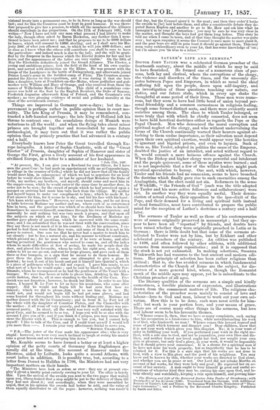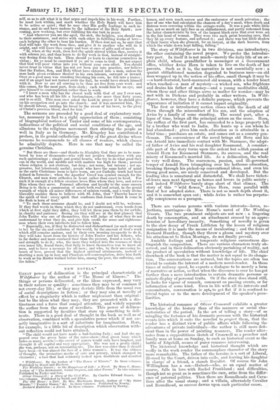TAULER'S LIFE AND SERMONS. ° DOCTOR Ram TATTLER was a celebrated
German preacher of the fourteenth century, about the middle of which he may be said to have flourished. He formed one of a numerous class of persons, both lay and clerical, whom the corruptions of the clergy, the violence and disorders of the times, and the unseemly disputes between Popes and Emperors in which as usual the chief suffering fell upon the people, drove upon self-inquiry, and an investigation of those questions touching our nature, our duties, and our future state, which in every age shake the thoughtful at some period of their lives. Those men were numerous, but they seem to have had little bond of union beyond personal friendship and a common earnestness in religious feeling, though some formed distinct sects, and there were evidently secret societies among them. The class to which Tallier belonged, or more truly that with which he chiefly consorted, does not seem to have held heretical doctrines either as regards the Pope or the Papal Church. Men who denounced the moral corruption and spiritual neglect of the clergy, and who without undervaluing the forms of the Church continually warned their hearers against attaching to them undue importance, as their salvation must depend upon their own spiritual exertion, would appear very like heretics to ignorant and bigoted priests, and even to laymen. Such of them as, like Tallier, adopted in politics the cause of the Emperor, doubted the justice of an interdict, and acted without regard to it, would commit a more heinous offence against the Church. When the Bishop and higher clergy were powerful and intolerant and the people quiescent, some of these mystics were burned ; and it is not improbable that a few of the wilder leaders might push mystical speculation to heresy. One sect, with which, however, Tauler and his friends had no connexion, seems to have broached the doctrine which finally gave rise to such enormities among the Anabaptists, that the elect could not sin. Reformers in the sense of Wickliffe, "the Friends of God" (such was the title adopted by Tauler and his more active followers and collaborateurs) were not. In another way they were equally useful. Their denunciation of actual abuses, their opposition to the ipse-dixit of the Pope, and their demand for a living and spiritual faith instead of dead formalities, must have contributed to prepare the public mind for the reception of Luther's doctrines a century and a half later.
The sermons of Tauler as well as those of his contemporaries were of course originally preserved in manuscript ; but they appear to have been all reported" by friends, and doubts have been raised whether they were originally preached in Latin or in German : there is little doubt but that some of the sermons attributed to Tauler were not by him, but by Eckhart and other celebrated preachers of the century. An edition was published in 1498, and often followed by other editions, with additional sermons from manuscript repositories ; and it is supposed that the stock is not yet exhausted. In making selections, Susanna Winkworth has had recourse to the best ancient and modern editions. Her principle of selection has been rather religious than critical ; that is, she has avoided sermons in which fundamental characteristics of the Church of Rome are the subject, for discourses of a more general kind, where, though the Romanist monk of the middle ages may appear, yet he is subordinate to the Christian preacher of all ages. The literary qualities of the sermons are a simple and kindly earnestness, a forcible plainness of expression, and illustrations drawn from the commonest matters of life. The religious characteristics of the preacher seem mainly to consist of love and labour—love to God and man, labour to work out your own salvation. How this is to be done, each man must settle for himself; but work is your portion here, and your means of grace. There are of course many other things in the sermons, but love and labour seem to be his favourite themes.
"Whence conies it, then, that we have so many complaints, each saying that his occupation is a hinderance to him, while notwithstanding his work is of God, who hindereth no man? Whence comes this inward reproof and sense of guilt which torment and disquiet you ? Dear children, know that it is not your work which gives you this disquiet. No; it is your want of order in fulfilling your work. If you performed your work in the right method, with a sole aim to God, and not to yourselves, your own likes and dislikes, and neither feared nor loved aught but God, nor sought your own gain or pleasure, but only God's glory, in your work, it would be impossible that it should grieve your conscience. It is a shame for a spiritual man if he have not done his work properly, but so imperfectly that he has to be rebuked for it. For this is a sure sign that his works are not done in God, with a view to His glory and the good of his neighbour. You may know and be known by this, whether your works are directed to God alone, and whether you. are m peace or not. Our Lord did not rebuke Martha on account of her works, for they were holy and good ; He reproved her on account of her anxiety. A man ought to busy himself j,n good and useful occupations of whatever kind they may be, casting his care upon God, and labour silently and watchfully, keeping a rein upon himself, and proving him • The Hiztory and Life of the Reverend Doctor John Tauler of Strasbourg ; with Twenty-fice of his Sermons (1340). Translated from the German, with Additional Notices of Taulees Life and Times. By Susanna Winkworth, Translator of" Theologin Gemmniea" ; and a Preface by the Reverend Charles Kingsley. Published by Smith and Elder.
self, so as to sift what it is that urgea and impels him in his work. Further, he must look within, and mark whether the Holy Spirit will have him to be active or quiet ; that he may obey His godly leadings in each instance, and do and have undone by the influence of the Holy Spirit ; now resting, now working, but ever fulfilling his due task in peace. "And wherever you see the aged, the sick, the helpless, you should run to their assistance, and strive with each other in fulfilling works of love— each helping the other to bear his burden. If thou dost not so, be sure that God will take thy work from thee, and give it to another who will do it aright, and will leave thee empty and bare at once of gifts and of merit.
"If, when at thy work, thou feel thy spirit stirred within thee, receive it with solemn joy, and this learn to do thy work in God, instead of straightway fleeing Irons thy task. Thus should ye learn to exercise yourselves in virtue ; for ye must be exercised if ye are to come to God. Do not expect that God will pour virtue into you without your own effort. You should never trust in virtue that has not yet been put into practice, nor believe that the Father, Son, and Holy Ghost have entered into a man, unless the man hath given evidence thereof in his own labours, outward or inward. Once as a good man was standing threshing his corn, he fell into a trance ; and if an angel had not turned aside the flail, he would have struck himself with it. Now ye are all craving to be thus set free from your work : and this comes, for the most part, from sloth ; each would fain be an eye, and give himself to contemplation rather than to work. "I know a man who has the closest walk with God of any lever saw, and who has been all his life a husbandman,—for more than forty years, and is so still. This man once asked the Lord in prayer if he should, give up his occupation and go into the church : and it was answered him, No; he should labour, earning his bread by the sweat of his brow, to the glory of Christ's precious blood, shed for him."
The sermons are preceded by a good deal of explanatory matter, necessary in fact to a right appreciation of them ; consisting of biographical notices of Tauler and some of his contemporaries, indications of the political and social conditions of the age, and. allusions to the religious movement then stirring the people as well in Italy as in Germany. Mr. Kingsley has contributed a preface, in its genial catholicism worthy of the great divine whose sermons he recommends to all classes of readers, which classes he admirably depicts. Here is one that may be called the genuine Christian.
"But there are those—and thanks to Almighty God they are to be numbered by tens of thousands—who will not perplex themselves with any such questionings ; simple and genial hearts, who try to do what good they can in the world, and meddle not with matters too high for them ; persons whose religion is not abstruse, but deep ; not noisy, but intense ; not aggressive, but laboriously useful ; people who have the some habit of mind as the early Christians seem to have worn, ere yet Catholic truth had been defined in formulae; when the Apostles' Creed was symbol enough for the Church, and men were orthodox in heart rather than exact in head. For such it is enough if a fellow creature loves Him whom they love, and serves Him whom they serve. Personal affection and loyalty to the same unseen Being is to them a communion of saints both real and actual, in the genial warmth of which all minor differences of opinion vanish, and a truly divine liberality enables them to believe with St. John, that 'Thereby know ye the spirit of God : every spirit that confesses that Jesus Christ is come in the flesh is born of God.'
"To such these sermons should be, and I doubt not will be, welcome. If they find words in them which they do not understand, even words from which at first sight they differ, they will let them pass them by for awhile, in charity and patience. Seeing (as they will see at the first glance) that John Tauler was one of themselves, they will judge of what they do not understand by what they do, and give him credit for sense and righteousness where their own intellects fail to follow him.
"Especially, too, if they be distracted and disheartened (as such are wont to be by the sin and confusion of the world, by the amount of God's work which still remains undone, and by their own seeming incapacity to do it, they will take heart front the history of John Tauler and his fellows, who in far darker and more confused time than the present, found a work to do, and strength to do it ; who, the more they retired into the recesses of their own inner life, found there, that fully to know themselves was to know all men, and to have a message for all men ; and who, by their unceasing labours of love, proved that the highest spiritual attainments, instead of shutting a man up in lazy and Pharisaic self-contemplation, drive him forth to work as his Muter worked before him, among the poor, the suffering, and the fallen,"



























 Previous page
Previous page